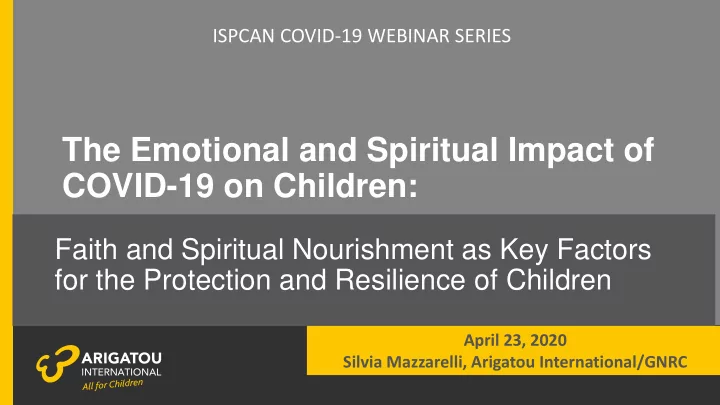

ISPCAN COVID-19 WEBINAR SERIES The Emotional and Spiritual Impact of COVID-19 on Children: Faith and Spiritual Nourishment as Key Factors for the Protection and Resilience of Children April 23, 2020 Silvia Mazzarelli, Arigatou International/GNRC
Direct and Indirect Effects of COVID- 19 on children 1. Falling into Poverty 2. Learning 3. Safety and Protection 4. Survival and Health (UN policy Brief on the Impact of COVID-19 on Children) 5. Spiritual Development
Art. 27, Convention on the Rights of the Child • Art 27 recognizes the right of every child to a standard of living adequate for the child’s physical, mental, SPIRITUAL, moral and social development. • Does not define what spiritual development is. • Leaves to parents and caregivers the primary responsibility to provide the means and life conditions for this comprehensive development.
SPIRITUALITY / SPIRITUAL DEVELOPMENT
Spirituality “The aspect of humanity that refers to the way individuals seek and express meaning and purpose and the way they experience their connectedness to the moment, to self, to others, to nature, and to the significant or sacred” (Puchalski, 2009).
Spiritual Development of a Child SIX ELEMENTS: 1. Embedded with notion of child, inherent It’s a Process 2. 3. Search 4. Relationships 5. Environment 6. Not just within religion
Elements of Spiritual Development 1. Inherent • Children are “spiritual beings”. • Spiritual development is intrinsic in every human being, deeply interconnected with other human dimensions.
Spiritual Development 2. It’s a Process • Starting from early childhood. • Consider the development capacities and development stages of the child.
Spiritual Development 3. Search 4. Relationships Ethics of Care Constant search for the meaning and purpose of life. “UBUNTU”: I AM BECAUSE YOU ARE Connection and relation with: • Self • Others • Nature • God-Divine-Transcendent
Spiritual Development 5. Environments Families Communities Schools Policies
Spiritual Development In summary: 6. Not just within religion • Being grounded • Being lifted up – search for purpose • Connect with others and contribute to society SPIRITUAL NURTURE: Enabling children to pursue their own spiritual development.
Faith and Spirituality
Faith and Spirituality • Faith leaders and communities can contribute significantly to the comprehensive development of children, particularly by nurturing their spiritual dimension. • Common principles linking the CRC with religious teachings: • Holistic notion of the child • Comprehensive understanding of the physical, emotional, social,, and spiritual needs. • Faith plays a significant role in the lives of the most of the world’s population and most people turn to religious guidance and support in times of acute need and crisis.
From Access and Social Capital to Spiritual Capital Spiritual capital - faith traditions can uniquely draw on and engage faith resources and authority - through prayer, sermons, sacred texts and religious rituals. This can play a key role in transforming beliefs and practices that underpin child maltreatment, reaffirming religious imperatives for protection and prevention and stand against the moral normalisation or silencing of abuse. Social capital - faith actors bring social influence, organisations, funds, buildings, people and motivation to the EVAC task. However they are used by secular actors as instrumentally valuable only. This involves no engagement with their spiritual aspects Access capital - faith leaders are used only as initial gatekeepers to the local community. They are employed in token, one off ways by the wider child sector to 'open the gate' only. They are seen to play no ongoing positive roles in the EVAC task and may even be seen as a liability.
COVID- 19’s Impact on the Spiritual Wellbeing of Children
Some Effects: 1. Fear and anxiety about self-isolation and physical/social distancing 2. Psychological and emotional stability is affected by the increasing uncertainty regarding their future 3. Confinement measures and lockdowns have broken their connections with others 4. Children are asking themselves existential questions 5. And when the responses they receive fail to address their questions, it breaks the sense of trust and respect for other human beings.
Faith and Spiritual Nourishment as a source of Resilience and Protection 1. Spiritual nourishment (or faith and spiritual nourishment) in children can be an important source of resilience an protection, especially in the context of adverse situations: • Have the potential to answer to deep existential needs and questions • Can help children to make sense of the suffering • Can help children cope with uncertainties • Can facilitate healing and rebuilding of connections and trust • Recognize and reinforce their strengths as survivors • Gives new meaning to their traumatic experiences.
The relationship between resilience and spirituality from the Literature Review (Andrade, 2016)
INTERDISCIPLINARY AND MULTISTAKEHOLDER RESPONSE APPROACH
Multi-stakeholder and Interdisciplinary Response Approach to the Pandemic 1. Spiritual nurture and care need to be interdisciplinary 2. Governments cannot provide an adequate and meaningful response to the impact of the pandemic on children; It has failed in address some crucial dimensions of comprehensive wellbeing of the children 3. We believe it is important to acknowledge the unique contribution of different stakeholders, including faith actors. 4. Bring everyone to the table and Work more Together!
THANK YOU GRACIAS MERCI GRAZIE s.mazzarelli@arigatouinternational.org www.arigatouinternational.org
Recommend
More recommend